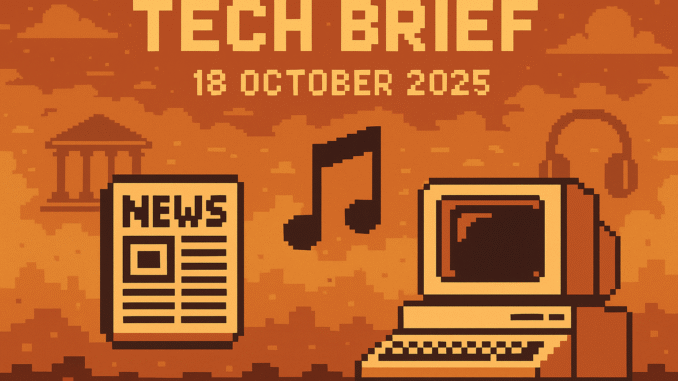
Tech Brief 18 October 2025 is your daily circuit through the headlines that matter, whether you’re archiving old mixtapes or still reading newsprint with ink-stained fingers. OpenAI’s rules, Spotify’s AI ambitions, and Google’s legal headaches all make the cut today. Missed yesterday’s Tech Brief? Catch up here before diving in.
OpenAI Bans Historical Deepfakes After Sora Generates MLK Video
“Not everything digital is fair game,” quipped OpenAI’s latest update. This week, the Sora video tool was caught reproducing footage of Martin Luther King Jr., prompting OpenAI to slam the door on using its tech for impersonating public figures. Moderators now patrol prompts and outputs, aiming to shut down a rising tide of AI-generated fakery and historical confusion. Sora’s technology blends natural language with video generation, giving creators rich control, but risks leapfrogging traditional boundaries around identity and trust. For archivists and digital historians, the new policy is more than a technical story; it’s a warning shot across the bow of authenticity, a word that’s always loaded in retro and scene circles. Will it work? That depends. The next arms race may not be with code but with meaning itself.
Spotify Pairs With AI Startups to Reinvent Playlists
How do you curate the perfect playlist now? Spotify thinks the future is in AI-driven collaborations, bringing companies like Endel and Boomy onboard to create “supercharged” listening experiences. Instead of compiling mixtapes with careful timing and button-pressing, algorithms now read your mood and serve bespoke sounds, shifting the role of curation from nerdy hobby to seamless background. There is excitement and uncertainty in the air. Artists see new tools, but also risk their music being diluted into a generic audio wallpaper. Will listening lose its character, or just swap fingerprints for data points? Unlike the old days of swapping copied tapes after school, playlists today build from patterns rather than personalities. And yet, the tension lingers. Can a machine ever pick just the right song for a heartbreak, or is some magic still out of reach?
Italian Publishers Take Google to Court Over AI Text Use
Fact: Italian publishers have filed a lawsuit against Google in Rome, demanding damages for what they claim is “unconsented use” of news text by the tech giant’s AI engines. Google’s approach, training large language models on public content, feels eerily similar to the BBS debates about text archives back in the 80s, except now the stakes involve global newsrooms and big lawsuits, not just angry letters. As Google insists all is above board, publishers worry about lost revenue and journalistic integrity. There is something cyclical about it. Content creators push for credit, while platform owners argue that innovation comes first. In a sea of recycled stories, maybe the real question is who will still be writing news worth scraping five years from now.
From the Wayback Machine
On This Day: 2012: Newsweek Ends Print Edition
Eighty years in print history ended when Newsweek declared its last physical issue for December 2012, moving to an all-digital subscription model. Financial strain forced the change, as subscribers and advertisers left for the online world. The move reflected how digital transformations disrupt even the most storied names. Britain watched too, with many local publications repeating the pattern. Newsweek’s migration shaped today’s landscape. Real archives became PDFs and “collectible” meant a folder of old scans, not yellowing paper.
Today’s Big Question
What does authenticity mean when both news and music are shaped by algorithms and AI? Tech Brief 18 October 2025 leaves the answer open. Personal curation and editorial trust still matter, but how we safeguard them in a generative world might decide what actually lasts, and what simply scrolls by.
Boot up your rescued Amiga, open the archives, and keep your curiosity dialled to eleven. Nostalgia’s more fun if you’re still asking questions.
Missed yesterday’s Tech Brief? Catch up here

Leave a Reply